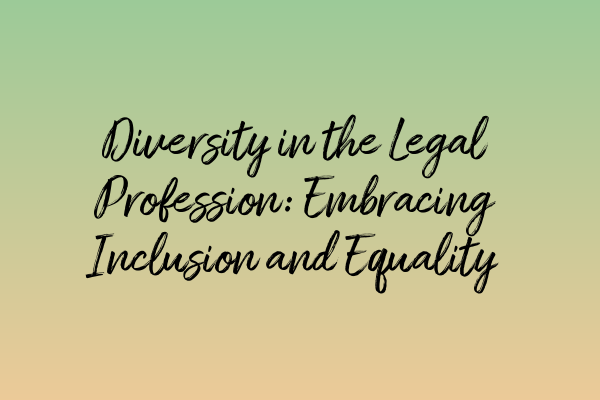Diversity in the legal profession is an important and timely topic. Embracing inclusion and equality is not only the right thing to do, but it also leads to a more effective and representative legal system. In this blog post, we will explore the benefits of diversity, discuss the current state of diversity in the legal profession, and provide actionable steps for promoting inclusion in the industry.
The Benefits of Diversity in the Legal Profession
Diversity brings a multitude of benefits to the legal profession. Firstly, it allows for different perspectives and experiences to be represented, which leads to better decision-making and problem-solving. When diverse voices are heard and valued, a wider range of ideas and solutions can be considered.
Secondly, diversity fosters greater trust and confidence in the legal system. When individuals see people who look like them or share their background in positions of authority, they are more likely to believe in the fairness and impartiality of the legal process. This, in turn, promotes a sense of legitimacy and encourages individuals to actively engage with the legal system.
Furthermore, diversity within the legal profession improves access to justice. People from marginalized communities often face unique legal challenges and may feel hesitant to seek legal advice due to mistrust or lack of representation. By increasing diversity, we can bridge this gap and ensure that all individuals have equal access to legal services.
The Current State of Diversity in the Legal Profession
While progress has been made in recent years, the legal profession still has a long way to go in terms of diversity and inclusion. According to a recent study, only a small percentage of partners in law firms come from diverse backgrounds, and women and minority lawyers continue to be underrepresented in leadership positions.
In addition, there are disparities in the representation of certain groups within the legal profession. For example, LGBTQ+ individuals, individuals with disabilities, and individuals from certain ethnic or religious backgrounds may face unique challenges and barriers to entry.
It is essential to acknowledge these disparities and work towards creating a more inclusive and equitable profession.
Promoting Diversity and Inclusion in the Legal Profession
There are several actionable steps that can be taken to promote diversity and inclusion in the legal profession.
Firstly, law firms and legal organizations should prioritize diversity in their hiring practices. This includes actively seeking out candidates from diverse backgrounds and implementing inclusive recruitment strategies. Additionally, firms should provide training and mentorship opportunities to help support the professional development of diverse lawyers.
Secondly, it is important to create a culture of inclusion within the profession. This involves fostering an environment where all individuals feel valued and respected, regardless of their background. This can be achieved through initiatives such as diversity training programs, employee resource groups, and inclusive leadership practices.
Finally, promoting diversity and inclusion requires ongoing commitment and accountability. Law firms and organizations should regularly assess their progress, set goals for improvement, and hold themselves accountable for achieving those goals. It is important to continuously evaluate and refine diversity initiatives to ensure their effectiveness.
Conclusion
In conclusion, diversity in the legal profession is crucial for a fair and effective justice system. By embracing inclusion and equality, we can benefit from different perspectives, improve access to justice, and foster trust in the legal system.
It is essential that we continue to work towards creating a legal profession that is representative of the diverse communities it serves. By prioritizing diversity in hiring, fostering an inclusive culture, and holding ourselves accountable, we can make significant progress towards a more diverse and inclusive legal profession.


Leave a Reply